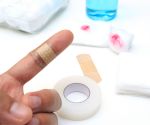Let’s say your child has a nasty cut that seems like it may leave a scar in a visible place. Should you get a plastic surgeon to tend to it? Go to the emergency department (ED)? Or have your pediatrician close the wound in an office visit?
It depends on the location and how deep the cut is. If possible, talk to your pediatrician before heading to the ED. Sometimes smaller lacerations can be treated and closed with new super skin glues or Steri-Strips right in your doctor’s office. If the injury warrants a trip to the emergency department, the ED docs stitch people up all the time, so they are pretty expert at making fine cross-stitches and being sensitive to scarring issues. However, if a laceration is very jagged, many layers deep, or located over a joint, or there is potential for nerve damage, then I would recommend having a plastic surgeon do the job. I’d also recommend seeing a plastic surgeon for large lacerations on the face, mainly for cosmetic reasons.
From The Smart Parent's Guide: Getting Your Kids Through Checkups, Illnesses, and Accidents by Jennifer Trachtenberg.

More About this Book
The Smart Parent's Guide: Getting Your Kids Through Checkups, Illnesses, and Accidents
Continue Learning about Injuries, Wound and Trauma
Important: This content reflects information from various individuals and organizations and may offer alternative or opposing points of view. It should not be used for medical advice, diagnosis or treatment. As always, you should consult with your healthcare provider about your specific health needs.





